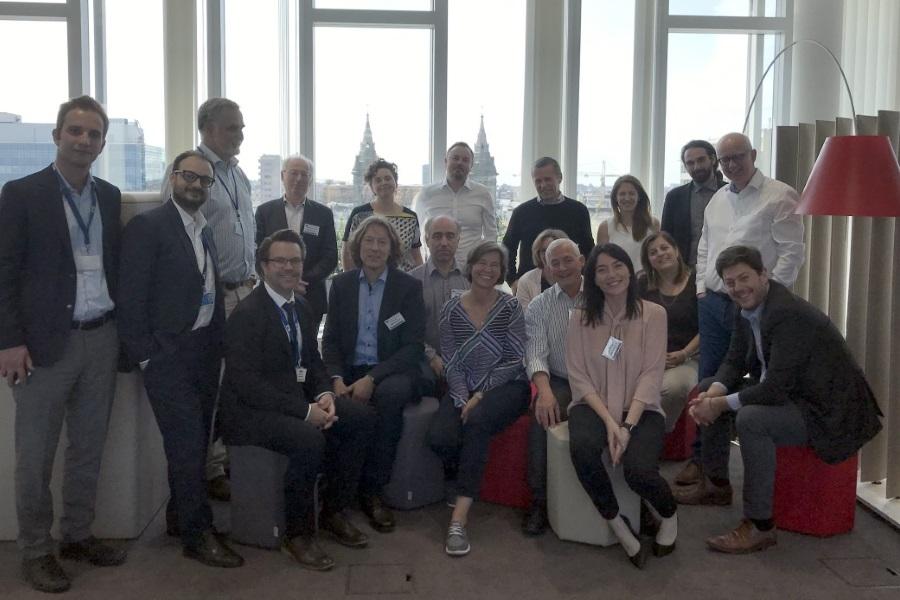
By: Cathrin Stover, EOSC Executive Board Vice Chair
During the EOSC Executive Board (EB) meeting on 24 May I felt that now we really had found our feet – it was the first real working meeting, with all EB members around the table fully engaged and pushing forward. So, what did we do?
Well to begin with, we shortly recapped the EB-GB teambuilding event in Munich – you may have seen the blog I wrote on this: https://www.eoscsecretariat.eu/news-opinion/eosc-governance-meets-munich-our-elephant-takes-clearer-shape and there is also a very good and more detailed description of the event available here: https://www.eoscsecretariat.eu/news-opinion/outcomes-first-eosc-gb-eb-meeting-7-8-may-munich Not much more to say about this event, apart from the fact that we felt it was so very useful that we are planning to repeat it – possibly in early November this year.
The next item on our agenda was an overview from Trust-IT, who leads the communications in the EOSCSecretariat. They updated on internal and external communications and stakeholder engagement activities – I have taken away this very good slide for you – it gives you an overview of the upcoming key EOSC related events – more information on all these events, is available here: https://www.eoscsecretariat.eu/news-events-opinion/events

While we are on the subject of events, here’s another one which should make it early on into your calendar: The European Research and Innovation Days in Brussels, 24-26 September 2019, see here: https://ec.europa.eu/info/research-and-innovation/events/upcoming-events/european-research-and-innovation-days_en (hotel prices are already outrageous for these days, get your travel sorted early!).
Next on was a presentation from Ingrid Dillo from the FAIRSFAIR project. We had taken a decision that we will be inviting one EOSC related project every time the EOSC EB meets. Ingrid gave an overview of the project which started on 1 March 2019 and she focused on the way the project plans to integrate and syncronise within the bigger EOSC-project environment and the EOSC EB working groups. The EB members expressed their support to this level of actively seeking integration and suggested that FAIRSFAIR could serve as an example to all EOSC-projects to ensure convergence of planning and positioning.
We then discussed the Strategic Implementation Plan, which was written by Sarah Jones and Jean-Francois Abramatic and which I had presented on 22 May to the EOSC Governance Board. The document will be a living document, but the latest version will now be made available via the EOSCSecretariat site. Watch this space.
The main item on the agenda of our EB meeting was the progress made towards the formation of the EOSC EB working groups (WGs). This was a long conversation and not at all times what I would call easy. Here’s where we stand now: Member States and Associate Countries have appointed their experts through the GB. The GB appointments resulted in an already sizeable group per WG and the Chairs of the WG for Sustainability, Landscape and RoP have decided that to begin with, they will commence the work in the WGs with the GB appointed experts only. Once initial meetings have taken place and potential skills gaps have been identified in these WGs, the Chairs will either nominate additional experts or run an open call for additional WG members. The FAIR WG has also accepted all nominations from the GB and the EB has appointed a few additional experts to this WG. The Architecture WG has accepted all nominations from the GB and also all nominations which had been collected by the EC from EOSC related projects. Both FAIR and Architecture will an run open call, should a skills gap be identified.
What does this decision mean for the EOSC related projects and our stakeholder community? It means that the EB encourages all the projects to look closely at how their work can be shared and integrated with the WGs and the stakeholder community to interact with us in the upcoming events. We are committed to ongoing dialogue!
The first WG meetings are now being organized and will be held via conference calls or webinars. The EOSCSecretariat has invited various EOSC projects to a meeting in Turin at the beginning of June to discuss further how the projects can explore synergies, and also how the projects can support the working groups.
As a summary from the EB meeting on 24 May:
The Strategic Implementation Plan is to be made available to you all asap. The working groups will start their work now, and there is a great list of upcoming events for the stakeholder community to meet and discuss the first results from the work carried out in the WGs.
- Portal News